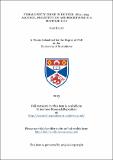Female petty crime in Dundee, 1865-1925 : alcohol, prostitution and recidivism in a Scottish city
Abstract
Late-nineteenth and early twentieth-century Dundee had a strikingly large female
workforce and this fact has attracted much scholarly attention. But existing research
has not probed the official crime records to determine whether the associated local
stereotype of the disorderly mill worker, as a ‘moral blot’ on the landscape, is
justified. This study looks at female criminality in Dundee 1865–1925. It finds that
drunkenness, breach of the peace and theft were the leading female offences and that
the women most strongly associated with criminality belonged to the marginalised
sections of the working class. Amongst them were the unskilled mill girls prominent
in the contemporary discussions, but it was prostitutes and women of ‘No Trade’ who
appear to have challenged the police most often. They were frequently repeat
offenders and consequently this thesis devotes considerable attention to the women
entrenched in Dundee’s criminal justice system. A pattern noted in the city’s
recidivism statistics, and often echoed elsewhere, is that the most persistent offenders
were women. The fact that men perpetrated the majority of petty crime raises the
suspicion that the police statistics capture differential policing of male and female
recidivists – an idea that builds upon feminist theory and Howard Taylor’s stance on
judicial statistics. Yet a detailed study of the archives reveals that there are as many
examples of the police treating women fairly as there are of gender-biased law.
Indeed, several practical constraints hindered over-zealous policing, one of which was
the tendency of the local magistrates to throw out cases against prostitutes and female
drunks. This thesis, taking the police and court records as a whole, emphasizes that it
was generally pragmatism, rather than prejudice, that guided the sanctioning of
female recidivists in Dundee.
Type
Thesis, PhD Doctor of Philosophy
Rights
Creative Commons Attribution-NonCommercial-NoDerivs 3.0 Unported
http://creativecommons.org/licenses/by-nc-nd/3.0/
Collections
Except where otherwise noted within the work, this item's licence for re-use is described as Creative Commons Attribution-NonCommercial-NoDerivs 3.0 Unported
Items in the St Andrews Research Repository are protected by copyright, with all rights reserved, unless otherwise indicated.


